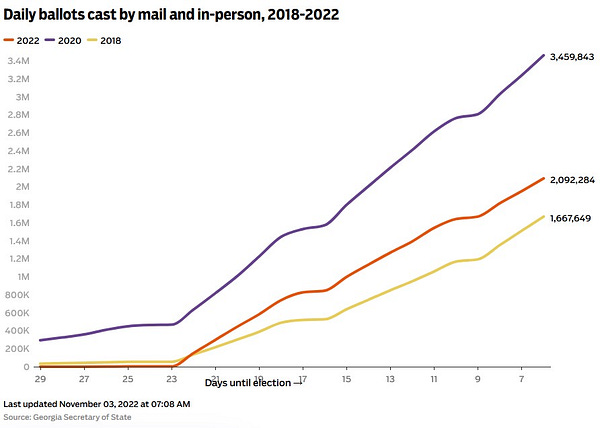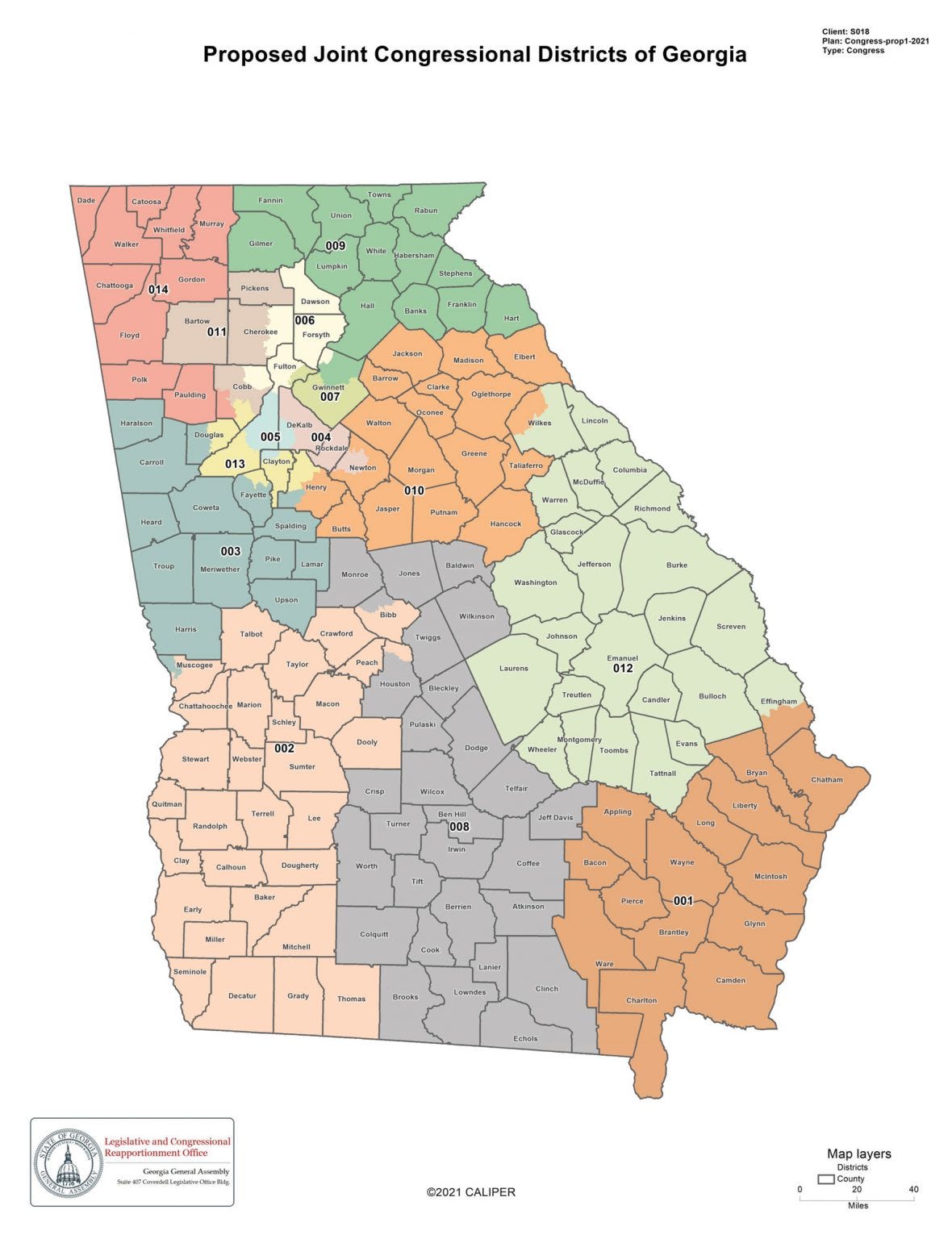Early voting #'s are not looking good...
The Update - 11/3/2022
Welcome to my freemium newsletter by me, King Williams. A documentary filmmaker, journalist, podcast host, and author based in Atlanta, Georgia. This is a newsletter covering the hidden connections of Atlanta to everything else.—Get out and vote!
Today is the last day of early voting
If you haven’t voted already please get out and vote. The last day to do so after today is Tuesday, November 8th. If you would like to request an absentee ballot, that time has passed. All ballots must’ve been requested by October 28th and returned by November 8th. If you have not received your ballot you must go in person today or Tuesday to do so. If your ballot arrives by then, still bring it to your county registrar or board of elections. You can also bring it to your polling place as well.
1. Early Voting numbers so far are dwindling
Despite the early praises from the Secretary of State’s office, early voting numbers are declining at a rate much steeper than in 2018 or 2020. This was always going to be the case due to the state GOP-led ‘voter reforms’ of 2021 and 2022. It’s working.


Voter suppression by another name
There are 7 million+ registered voters in the state of Georgia. Over 4 million voted in 2018. Over 5 million voted in 2020. We may not make 2018’s overall voter total despite media narratives (mostly cheered on by the Secretary of State’s office) of record high turnout—it’s been a deliberately misleading statement. It’s showing up more now, SB202 + the Secretary of State’s decision to drastically limit voting by absentee alongside the initial drop in automatic voter registration is working.
There are nearly 1.4 million fewer voters compared to the 2020 election, leading to a big possibility that 2022’s overall total doesn’t make it to even 2018’s levels. Georgia would need to clear at least 1.5 million voters on Tuesday to just reach 2018’s totals, . And 2.5 million voters to reach 2020’s totals, in 2020 only 1 million people or 20% of overall voters, voted on election day. Evidence so far leads to a turnout at or below 1 million voters showing up on November 8th, meaning every vote will weigh more.
2. Will there be a runoff?
There are indications that there may be a runoff for at least US Senate and maybe Governor. The Warnock campaign is already running (clever) ads letting voters know that the week of Thanksgiving could be another week of voting. The ad is encouraging would-be voters to avoid this runoff by going out to vote. While for those current supporters that the next election is November 29th. While Team Walker is running redemption ads ahead of a potential runoff. In order to avoid a runoff, one of the candidates would need to clear 50.1% of the vote to win.

The shortened window for the runoff is also a byproduct of SB202, the Republican-led attack bill passed in 2021 and amended in 2022. The window of voting in the runoff was shortened from 8-weeks to 4 weeks (likely as revenge for the 2021 runoffs). Evidence of a decline in turnout due to the runoff period was already showing over the summer. Considering the next runoff would be over the holiday period, the GOP stands the most to win in that scenario, as Democratic decline is likely to be much heavier.
3. The story of 2022 will be about voter apathy, disillusion, and the departure of Black voters—or not
Black voters seem to be in a malaise around President Biden, while still showing the most overall support for the president (support which is slowly moving upward). The most significant swings will be on those who are defectors from the Dems for a seeming lack of action. Based on early voting, it’s been older Black Georgians showing up.
Despite the constant stories of Black men not feeling enthused by Abrams and the national Dems, Black men are the second most consistent voting bloc of the party. This in turn has seen the Abrams campaign make some internal reconfigurations to address Black men directly, including a list of things Abrams is aiming to help Black men with, something Kemp has not done despite the narratives of him doing so. Both Abrams and Warnock need more Black voters from Gen X through (especially) Gen Z to show up and bring their friends too if this is to be a competitive race.
4. Despite the rhetoric, GOP majorities tilted future elections in their favor
Whether or not Republicans believe the big lie of the 2020 election, the motion to suppress voters ahead of them was already in full effect. These elections are the first test of these varying systems across the country.
4b. The Republicans managed to distance themselves from ‘the Big Lie’ while still implementing policies reflecting that lie.
The post-2020 Republican Party has led a national effort to diminish Black and Democratic-leaning voters’ impact in future elections. Across the US, Republican-led state legislatures’ have gerrymandered political districts, removed or reduced access to ballot boxes, made changes to early voting, and implemented new changes to voter ID laws.
While in Florida, their GOP-controlled legislature has done all of the aforementioned things plus instituting fees for incarcerated people (an actual modern poll tax) to vote. Florida has also started arresting people accused of ‘illegally voting’, which has led to a reduced turnout. All of these are aided by a Supreme Court that is looking at two cases, one in North Carolina and one in Louisiana, that will likely enshrine this type of political strongman tactics into law, again.
4c. Kemp/Rafensperger’s policies for reducing turnout
These changes to voting since 2018 disproportionately affect people of color and those in rural counties, those who could also fit the demographic profile of a would-be Abrams/Democratic supporter. This included a perceived deliberate attempt to reduce absentee ballot access (ex: changing standards of who/when/locations/materials needed to receive ballots).
Add in the Secretary of State’s purging process of voter rolls via the ‘use or lose it’ policy, a policy that purged the votes of people who do not decide to vote. Or the use of the ‘exact match’ policy, a rejection of voter applications based on signatures and spelling of names. A policy that placed the burden on women, immigrants, those with disabilities, and non-traditional American names.
As well as the difficulties in producing ‘proper’ voter IDs for those who were either too far away from a location to get one, or those older Georgians who had issues with producing birth certificates. A policy that affects nearly 300,000 mostly Black and rural Georgians. In addition to a policy this year of denying most requests for absentee ballots. Something first noticed during the mayoral election of last year.
5. Georgia Republican redistricting hurt state Dems but more importantly, democracy
Last fall saw a new statewide map that enshrined a GOP majority until at least the 2028 election. The GOP has begun to rearrange local districts now, much to the chagrin of the Dems. The Supreme Court is hearing a series of challenges to gerrymandered maps, which could lead to a Jim Crow era of overtly white, racialized political representation again in the US…Yep, that could be a real possibility.
Is Jim Crow 2.0 here?
The redistricting of 2021 in Georgia saw a growing non-white, non-Republican base shrink in congressional representation with the GOP-led efforts. Most pronounced has been in emerging Democratic bases in Gwinnett county, the most diverse and soon to be most populated county. Alongside Cobb County, a historically white, conservative-led county that went for Hillary in 2016, then Biden in 2020.
A plethora of new election laws across the country, (over 300+) with GOP-led legislatures aimed at undermining the legitimacy of any election going forward. Add in a series of deliberate redistricting attempts at reducing Democrat representation across the country plus the upcoming cases to the Supreme Court in North Carolina and Louisiana may ensure GOP rule forever.

The corralling of more Dems into metro Atlanta districts, thus reducing the number of US congressional representatives for Democrats. Doing so would be a reflection of national trends of less, dense, whiter, and more conservatives having a disproportionate amount of influence in US politics.
Redistricting took out a promising Dem, plus another Dem district
The redistricting creates a scenario of 8R-6D or 9R-5D districts, taking out a strong Dem in the process. That saw two Georgia Democrats Lucy McBath (former GA06) and Carolyn Bordeaux (former GA07) in the crosshairs as both had to primary against each other in May. Gwinnett county lost a female, Democrat representative as its county was redrawn to include more of Forsyth County and Northeast Georgia.
Each of the new laws has attacked directly the biggest growth areas of the Democratic swing in ‘turning Georgia blue’. Republicans for decades aimed at reducing both competitive political districts and overall opposition turnout. The state’s GOP-led efforts, anchored by the Secretary of State’s Office and further aided by the state’s heavily Republican-leaning legislature, for two consecutive years have introduced new restrictions to access to voting.
In conclusion
For the GOP:
(cue sound of broken record) While the GOP can win by simply siphoning off some swing voters throughout the state, its biggest base is going to be a series of small but consistent voters turning out in the remaining counties. Plus the culture warrior stuff works, just ask Virginia. Or Florida.
For the Dems:
(cue sound of several broken records) For the Dems, the biggest area of improvement is going to be turnout within the stronghold of counties in the metro and their leadership in cities throughout the state.
In the 2020 election, the Dems won 7 of the 10 largest counties, beating their 2016 margins of victory in every county with an even greater percentage of victory. Of the 10 largest, most populated counties in the state, the Dems are in leadership positions (ex: mayors, county commissioners, voter preferences) in 8 of those 10. Within the 10 largest cities in the state, the Dems are at 10 of 10 mayors.
While the Dems must also focus on the black belt of voters between the coastal corridor of Savannah/Brunswick/Chatham County, Macon and Columbus areas throughout the state.
Overall
In both cases, both parties should be reaching out more to Asian and Latino voters who are still a wildcard of support. Overall it seems to be that Latino voters are slightly breaking for the GOP in this election, while Asian American voters are still not polled enough.
The bigger picture
By retaining the statehouse, Republicans can assure themselves not only power for at least the next decade, but they can also start affecting national politics as well.
Georgia has been over-indexed by white/conservative/Republican leadership for almost 20 years in the upper chambers of the statehouse. It’s even longer when you consider the history of the state of Georgia. Which has with surgical precision kept Black people, women, and non-conforming white leadership mostly boxed out of the highest levels of state law, state departments, and politics.
Georgia has been controlled by white men since before the US existed, with only its first-ever US Senators being either female Kelly Loeffler (2019), Jewish with Jon Ossoff (2021), or African American in Raphael Warnock (2021).
Not since the civil rights movement of the 1950s and 1960s has an effort been this concerted to deny the right to vote. But for the GOP this has been something they have been chipping away at ever since those gains made by African Americans in the 1960s. This barrage at reducing the vote has been built upon the lie of the 2020 election being fraudulent and the need for ‘voting reform’. Voter Suppression is the only chance the Georgia GOP has, it may work…
Voting in Georgia is always a mess, but it doesn’t have to be.
-KJW


